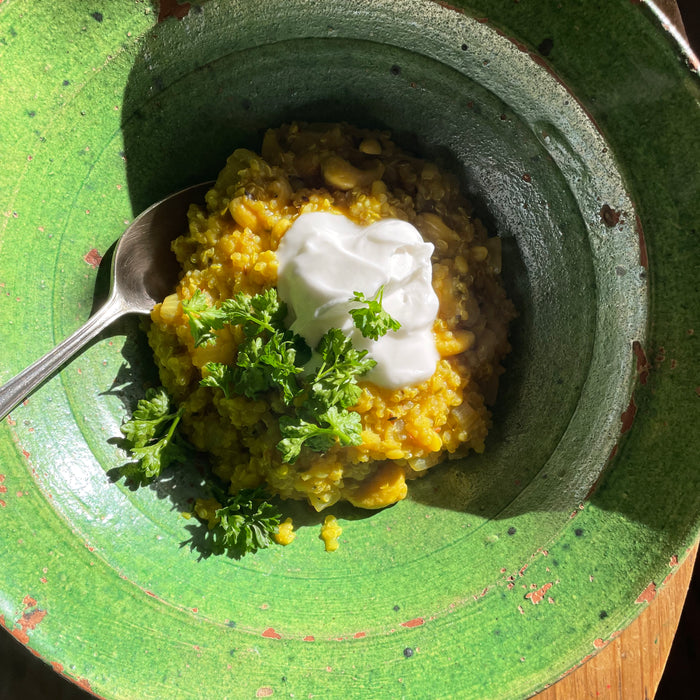Quinoa Cashew Moong Dhal Pilaf


When it comes to reducing the amount of waste we send to landfill as a population Anne Marie Bonneau, the zero waste chef sums it up perfectly “We don’t need a handful of people doing zero waste perfectly. We need millions of people doing it imperfectly”. But what can we as individuals do to reduce our household waste, single plastic use and decrease our carbon footprint?
The most important thing to remember is not to get excited and throw out all your current household items that are made from non-biodegradable materials and replace them with more eco-friendly choices. Wait until you have used up these items or they wear, tear or break before replacing them. Try to think of how you can repurpose, upcycle or use items in creative ways before anything gets sent to landfill.
One of the best ways we can reduce household waste is to upskill. Like learning to garden, plant and harvest our own fruits, vegetables and herbs. This can eliminate the carbon mileage of getting food to our plate and decreases the possibility of buying produce wrapped in single use plastics. Another great way is by supporting our local farmers by buying seasonal fruit and vegetables from farmers markets and roadside stalls.
Upskilling in the kitchen by learning to cook from scratch with fresh natural wholefoods will also reduce our household waste and is also beneficial for our physical and mental health. Another great way to reduce food waste is to create a menu each week, write a shopping list and stick to it. I also like to look in the fridge and pantry for food items I have leftover from the previous week and think of creative ways to use them in the following weeks menu.
Learning to sew, crochet or knit is also a way of upskilling so that clothes items can be repaired rather than thrown into landfill. I personally love to buy all my clothes from op shops. Australians are very good at donating clothing and household items to charity, but are not so good at sourcing our own wardrobes from them. I am a professional academic tutor and researcher on the Gold Coast and I have always successfully sourced all my work clothes from op shops and often get compliments on how nice I look at work.
Another good way to reduce waste is to use white vinegar and bicarb as universal cleaning products for all home cleaning purposes. I use them to clean surfaces, floors, the toilet, the shower, pretty much everything. The surprising part is, using these non-astringent natural cleaners also boosts the families gut microbiome. As we are not stripping the environment we live in of the bacteria that eventually ends up in our guts, this boosts our immune systems. Source four glass bottles with spray nozzles and fill them with water, vinegar and essential oils. One for the kitchen, one for the bathroom, one for the toilet and the last for glass and windows.
Learn to think creatively with items that are purchased before you throw them away. If you have to buy something that has packaging, try to find the item in a glass jar with a lid that can be reused later for storage or can be reused at a bulk store such as Santos Organics. I reuse tall caper jars to make my own never-ending vanilla essence (one split vanilla bean topped with rum, shaken and left in the dark for three weeks). Passata bottles are great for homemade nut milk bottles. Jars of all shapes and sizes can store beans, rice, flour, nuts, seeds, dried fruits, herbs, spices, pulses, legumes, shaved coconut, and herbal teas. You can also make jams, preserves and ferments, store leftovers and make transportable salads in them and you can even save all the rubber bands that tether vegetables like asparagus together and put them around a jar to make a coffee or tea cup that won’t burn your hands.
Making small changes to your household routine could also dramatically decrease your consumption of single use plastics. For example, we all know that carrying reusable material shopping bags in our handbags and car can reduce our yearly shopping bag use dramatically. But did you ever think about making your own produce bags from scrap material, or carrying a knife, fork, spoon and metal straw wrapped in a cloth napkin in your bag? or carrying your own coffee mug/water bottle?
There are also some simple bathroom swaps that over time can be incorporated into your routine. Purchasing a good quality safety razor (once you have used up the current razors in your home), or buying shampoo and conditioner bars. For the ladies, getting a menstrual cup and period underpants could save 240 sanitary products going into landfill every year. That’s around 9600 over a menstrual lifetime.
These are only a few of the many ways that we can reduce our individual waste production. In the words of Anne Marie Bonneau “We may never reach the zero in “zero waste” but that’s no reason to take zero action”.
Written by:
Megan Lee
Instagram @meganlovingmeagain
Twitter @MeganLeePhD